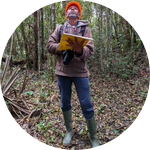About This Project
A female's body may have different needs throughout the reproductive cycle. However, we do not know how these needs change over the reproduction cycle for female black-and-white ruffed lemurs living in the rainforests of Madagascar. We will investigate potential changes in the diet, feeding, foraging behavior, nutrition and daily activity of this lemur before, during and after pregnancy and birth. This knowledge will help us to protect the resources that allow them to survive in the long term.
Ask the Scientists
Join The DiscussionWhat is the context of this research?
We have been monitoring various ecological aspects of communities of black-and-white ruffed lemurs in Ihofa rainforest since 2021, including some aspects of their reproduction such as mating, building nests and birth.
Pregnancy can lead to critical changes in pregnant females, including in nutritional needs, behavior and activity (Touitou, 2021). But there is a lack of knowledge about such potential changes in lemurs in the wild. Such knowledge can provide insights into understanding lemur reproductive ecology and tools to plan a conservation action that ensure resource availability during such delicate periods.
We aim to investigate the potential changes in the nutrition of female black-and-white ruffed lemurs before mating, during pregnancy, and after giving birth.
What is the significance of this project?
Black-and-white ruffed lemurs are endemic to the island of Madagascar and provide vital ecosystem services. Unfortunately, they are threatened with extinction due partly to habitat loss. Efforts undertaken for the continued survival of the species include restoring their critical habitats. Knowledge about the nutrient requirements and behavior of the female lemurs at various stages of their reproductive cycle can help in such endeavor. The findings of this project will allow us to identify their specific needs of these individuals in terms of diet, which can be used into determining the plant species to prioritize when restoring their habitats.
What are the goals of the project?
We will analyze the nutritional content of the food consumed by the females of black-and-white ruffed lemurs in the laboratory. We will quantify their daily nutrient intakes and associated energy gained across the reproduction timeline. This data will allow us to assess how dietary intake aligns with the changing physiological demands of reproduction. Data related on feeding and foraging behavior and daily activity have already been collected during the daily observations of the animals. We will compare the data prior to mating, during pregnancy, and after birth.
Budget
We collected lemur behavioral data from June to November 2023. It included time before lemurs started mating, female pregnancy and gave birth. Additionally, we collected food samples for nutritional analysis. Thus, we are seeking support to perform analysis of the nutrient content in their food items.
The requested fund will cover the use of the lab space, equipment and supplies needed to run the nutrient analyses of the food items at the FOFIFA lab.
Endorsed by
 Project Timeline
Project Timeline
We collected food samples and lemur behavioral data from June to November 2023. An important next step in our project is the nutritional analysis of food samples (20 plant species) using traditional and NIRS methods. We’ll quantify daily nutrient intake and energy gain across reproductive stages. After performing statistical analysis, Tojo will write and defend his Master’s thesis in May 2025 under the guidance of an academic and two technical advisors (Raoelinjanakolona and Nantenaina).
Jun 15, 2023
Data collection on lemur behavior and food samples in the field (June to November 2023)
Sep 23, 2024
Project Launched
Oct 14, 2024
Samples preparation. It consists of drying the samples to remove humidity before macronutrient analysis and to obtain their dry weight
Nov 11, 2024
Nutritional analysis using Near-Infrared Spectroscopy (NIRS) and traditional technique. It will take 2 months. This step constitutes the most important step of our on-going project
Jan 06, 2025
Data analysis
Meet the Team
Team Bio
We are a group of Malagasy students passionate about ecology and conservation. Nancia and Rindra have been studying various aspects of lemur ecology since 2019. Tojo recently joined our team to gain fieldwork exposure and experience, which sparked his interest in exploring more about lemur ecology for his Master. Opportunities and funding to do research on our unique biodiversity is often lacking for Malagasy students; thus, your support will be critical for us in carrying this project.
Tojonirina Jacquis Fenonaina
I am a MSc. student in Environnement, Santé et Développement Durable, at Institute of Environmentale Science and Techniques - University of Fianarantsoa, Madagascar. My primary professional goal is to become a scientific researcher in Ecology. After an initial exposure to field research when I was an undergraduate student, I became deeply fascinated to become a field ecologist. My recent participation as a field research assistant on research on lemur ecology reinforced my interests. Consequently, I decided to pursue even higher education to deepen my knowledge and practical skills in ecology and conservation. I am just starting a master's degree; and executing this project will fulfill the requirements of the degree. Through the combination of academic courses and practical research experience, I hope I can make lasting impacts in the field of conservation biology in Madagascar, to protect the precious biodiversity of my country.
Lab Notes
Nothing posted yet.
Project Backers
- 2Backers
- 4%Funded
- $55Total Donations
- $27.50Average Donation

